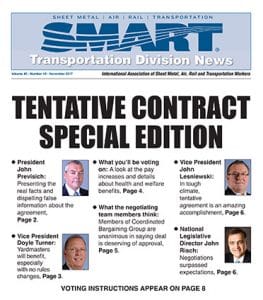The standard basic daily and mileage rates of pay negotiated under the new National Rail Agreement are now available on the SMART TD website.
The rate tables pertain to employees in the crafts of conductor, yardman, yardmaster, brakeman and engineer who are covered by the national contract and are retroactive to July 1, 2016.
The ratified contract covers more than 35,000 SMART Transportation Division members employed by BNSF, CSX, Kansas City Southern, Norfolk Southern, Soo Line, Union Pacific and numerous smaller carriers – all represented in national handling by the rail industry’s National Carriers’ Conference Committee.
To view the rates, select “Documents” in the blue-line menu bar near the top of the SMART TD homepage, then select “Rates of Pay.” For a direct link to the rate tables, follow this link.
Tag: 2017 National Rail Agreement
A special webpage has been created for members to read and download various documents related to the newly ratified National Rail Agreement that was approved by SMART TD members on Dec. 1, 2017.
Follow this link to view the signed agreements, questions and answers, a synopsis of the contract and other documents.
The page will be updated with additional information as available.
By a margin of nearly four to one, SMART Transportation Division members have voted to APPROVE the new National Rail Contract. The voting was conducted by BallotPoint Election Services, who certified the following results for each craft eligible to vote:
| CRAFT | ACCEPT | REJECT |
| Conductors | 79.89% | 20.11% |
| Brakemen | 78.98% | 21.02% |
| Engine Service | 76.58% | 23.42% |
| Yardmen | 79.97% | 20.03% |
| Yardmaster | 86.68% | 13.32% |
| Combined | 79.57% | 20.43% |
The approved contract will have an effective date of December 1, 2017, with implementation of new pay rates and employee healthcare cost-sharing modifications planned for January 1, 2018. Employees’ monthly healthcare contributions will remain frozen at $228.89 for the life of the contract.
The term of the agreement is for five years, from January 1, 2015 to December 31, 2019. In addition to a 3% increase previously negotiated and already implemented on January 1, 2015, the contract provides for full retroactive pay of 2% from July 1, 2016 through June 30, 2017, and 4% from July 1, 2017, until implementation of the new rates. Thereafter, affected members will receive a boost in wage rates of 2.5% on July 1, 2018, and 3% on July 1, 2019.
The ratified contract will cover over 35,000 SMART TD members employed by BNSF, CSX, Norfolk Southern, Kansas City Southern, Union Pacific and numerous smaller carriers, all of whom were represented in this round of bargaining by the rail industry’s National Carriers’ Conference Committee.
The SMART TD negotiating team was led by President John Previsich, who was assisted in the negotiations by Vice Presidents David Wier, John Lesniewski, Troy Johnson, John England, Doyle Turner and Jeremy Ferguson, along with General Chairpersons Danny Young (BNSF), Mark Cook (NS), Brent Leonard (UP) and Steve Mavity (CSX), all four of whom are nationally elected TD officers in addition to serving as General Chairpersons.
For this round of bargaining, SMART TD joined forces with five other unions to form the Coordinated Bargaining Group. The other unions in the CBG are the American Train Dispatchers Association; the Brotherhood of Locomotive Engineers and Trainmen (a Division of the Rail Conference of the International Brotherhood of Teamsters); the Brotherhood of Railroad Signalmen; the International Brotherhood of Boilermakers, Iron Ship Builders, Blacksmiths, Forgers, and Helpers and the National Conference of Firemen and Oilers/SEIU.
President Previsich commented: “I believe that our negotiating team, along with the teams from the other unions in the CBG, are to be commended for staying the course during a long and tedious round of negotiations. The easy thing for them to do when the going got tough was to declare defeat and walk away from the negotiating table, as others have done, but our team never wavered. By rejecting the carriers’ unreasonable demands while staying at the table and continuing to negotiate, the team was successful in obtaining an agreement that achieved an approval rate of 79.57%.”
###
The SMART Transportation Division, formerly the United Transportation Union, is the largest rail union in the United States representing members in all operating crafts, including engineers, conductors, trainmen, switchmen and yardmasters.
Click here or the image below to read the special edition of SMART TD News about the proposed National Rail Agreement.
Members of SMART TD eligible to vote on the tentative National Rail Agreement will be receiving packets in the coming days, triggering the 21-day balloting period.
Balloting packets left a production facility in Michigan on Friday, which caps off a process that began Oct. 6 when the tentative agreement was reached.
Inside the packets, members will receive a bound agreement booklet, a letter from SMART TD President John Previsich, a letter from Union Pacific General Chairperson Brent Leonard and a synopsis of the tentative contract. Voting instructions included in the packet have a 12-digit access code for each member to use when casting their vote via telephone.
Heralding the arrival of the agreement is a Special Edition of the SMART TD News mailed Monday that contains comprehensive facts about the agreement, including information on wage increases and the health plan.

For an additional update from the Collective Bargaining Group, click here.
Coordinated Bargaining Group Update To All Members
For immediate release: November 10, 2017
As previously announced on October 6, 2017, the six Rail Unions comprising the Coordinated Bargaining Group (CBG) have reached a Tentative National Agreement with the Nation’s Freight Rail Carriers. As this Update goes to press, members of all CBG Unions have either received their ballots, or soon will. All members are encouraged to review the Tentative Agreement and compare those terms and conditions to the other options before us and participate in your future by casting your vote.
As additional information to help your review, on November 2, 2017, the United States Senate confirmed two Republican nominees to serve as members of the National Mediation Board. This three-person Board is now controlled by a Republican majority, and it is the Government Agency that manages the mediation process that all Rail Labor Unions are currently involved in, pursuant to the Railway Labor Act. The National Mediation Board, in concert with the White House, will determine when the parties have officially reached an impasse, and will manage any potential Presidential Emergency Board activities for those Unions and Rail Carriers that do not reach a voluntary settlement.
In addition, the Rail Unions of the CBG must again condemn the interference by the Brotherhood of Maintenance of Way Employees (BMWE) in our ratification processes. These unprecedented attacks have escalated to a series of false accusations against the CBG Unions, and are clearly intended to harm our ratification of the Tentative Agreement. These slanderous accusations are without merit and in direct response to the CBG’s refusal to embrace BMWE’s proposals to change the Health and Welfare plan. BMWE, having failed to reach a voluntary agreement and in fact having given up on further negotiations, is now seeking to place your work rules and health care on the table as leverage for their benefit at a Presidential Emergency Board and ultimately in front of the United States Congress.
Your negotiating team and the affected General Chairmen of the CBG Organizations have considered all options and determined, unanimously, that the health care scheme proposed by BMWE is not in the best interest of our members even if the railroads were agreeable to such a plan (and there is no indication that the railroads are acceptable to the scheme). The BMWE proposal is just a proposal, one that no Rail Union outside of the BMWE coalition has publicly agreed to endorse. On the other hand, the agreement proposed by the CBG negotiators is real — it includes terms and conditions that protect our work rules, provides for minimal increases in health care that are more than offset by wage increases that are over twice the rate of inflation, with reasonable out-of-pocket maximums that protect our members from the impact of catastrophic medical events.
These are the facts; don’t be misled by any misrepresentations. We respect the right of any Organization to negotiate in the best interests of its members, and BMWE is certainly free to pursue any avenue it believes best, including denying their members the opportunity to vote on their future. But we also reject any Organization’s attempt to interfere in the sacred democratic process of those who have reached a voluntary agreement, especially when our elected representatives have unanimously endorsed the proposed agreement and have chosen to allow our members to cast a vote on their own future.
Refraining from attacking another Union in the performance of its negotiating obligations is a core principle of Trade Unionism. The Union interfering in your ratification process does not have the same exposure to significant work rules changes that you do and has publicly stated that it does not care if your work rules are eliminated. The leaders of that Union at the highest level have been repeatedly asked to stay out of our ratification process, and they have refused.
This is the opposite of true Brotherhood; don’t be conned by their anti-union activities. Take the time to understand all your options and the risks associated with each, and then be sure to participate by voting in your ratification process, a process that the interfering Union does not think you are entitled to.
# # #
The Coordinated Bargaining Group is comprised of six unions: the American Train Dispatchers Association; the Brotherhood of Locomotive Engineers and Trainmen (a Division of the Rail Conference of the International Brotherhood of Teamsters); the Brotherhood of Railroad Signalmen; the International Brotherhood of Boilermakers, Iron Ship Builders, Blacksmiths, Forgers, and Helpers; the National Conference of Firemen and Oilers / SEIU; and the Transportation Division of the International Association of Sheet Metal, Air, Rail and Transportation Workers.
Collectively, the CBG unions represent more than 85,000 railroad workers covered by the various organizations’ national agreements, and comprise over 58% of the workforce that will be impacted by the outcome of the current bargaining round.
To view this release in PDF form, click here.


